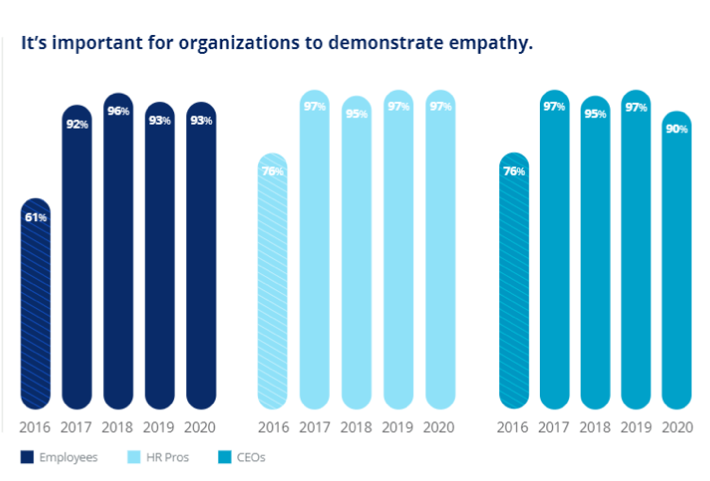Each February for the past five years, Businessolver has fielded research on the state of empathy in the workplace, gathering input from three stakeholder groups: US employees, HR professionals and CEOs.

2020 was no different. What changed is pretty much everything else.
As we created a benchmark for where we stood on workplace empathy just prior to the pandemic, the importance of this value has only grown over the past few months. In a crisis like we’ve been living through, empathy rises to the top in all our interpersonal relationships, including on the job. In the workplace, empathetic leadership is seen as a key factor in our economic recovery and our transition to the next normal.
With empathy so vital to both getting through and moving forward, just how prepared were leaders and their HR teams as they were unexpectedly called to address the dynamic needs of their organization and their employees in a time of unprecedented crisis?
Workplace empathy had risen in importance…then leaders began to stall
Since 2016, there has been an increasing focus on the importance of empathy in the workplace. Over the years of our study, employees consistently rated empathy as highly important. HR professionals became increasingly focused, but after an initial surge, leaders (CEOs) had drifted downward in their rating of organizational empathy as important.
Note: 2016 results reflect our pilot study, which was structured somewhat differently than subsequent surveys. In some cases, this may make the results appear skewed. However, we have included the 2016 numbers for baseline purposes.

Source: Businessolver.
Going into the pandemic, less than half of employees (48%) believed US organizations were empathic versus 76% of HR professionals and 83% of CEOs. However, all groups rated their own organization as ahead of the pack in terms of empathy, although for employees, their own organization was at a three-year low. HR professionals also felt that empathy was losing ground. They gave their own organizations a record high on empathy (95%) in 2018, but by 2020 this rating had slipped to 77%.
CEOs and HR got lower marks over time
The perception of both organizational leaders and HR departments in terms of empathy also eroded over time. When the empathy study was fielded early in 2020—prior to COVID-19--employees rated their own CEO at the lowest level in three years. HR professionals increasingly felt their own leader was empathetic, giving their CEO a grade of 88% in 2019. However, immediately prior to COVID-19, this fell to 74%.
HR departments also lost ground with both employees and leaders. Employees graded their HR teams 68%, a four-year low. CEOs gave HR higher marks for empathy (84%), but this represented a decrease from a high of 91% in both of the prior two years.
This may be surprising because both CEOs and HR professionals indicated empathy was becoming less challenging for them personally. In 2017, 68% of CEOs and 51% of HR professionals said it was hard to consistently demonstrate empathy in their day-to-day working lives. In 2020, these numbers fell significantly to 33% and 35% respectively.
When the going gets tough, empathy shines through
Going into the COVID-19 crisis there was a marked disconnect between CEOs and HR professionals’ perceived level of empathy and how their stakeholders viewed them, which indicates they might not have been as prepared as possible.
However, research shows they may have been prepared enough. When faced with the challenge of a global pandemic and the impact to their organization and their workforce, leaders and HR stepped up. They tapped into that well of empathy whether it was hard or not, and for the most part they have delivered. According to MetLife, prior to the pandemic 56% of employees felt valued and appreciated compared to 66% who felt the same as COVID-19 took hold.
While employees are feeling more enfranchised, there’s certainly both room and a need for improvement. Employees who feel supported are more motivated and productive, which is exactly what organizations need right now.
The focus on empathy has been increasing since we began our study. When we started, we had no idea that at the five-year mark our work would be punctuated by a global health crisis that would thrust empathy into an even brighter spotlight.
We find ourselves at a point in history where it’s never been more important to activate empathy in the workplace. As the leader of our organization, I take that mission personally. A pandemic offers a once-in-a-career opportunity for leaders like me and our HR teams to seize the moment and continue to build the empathetic workplace that will carry us successfully to what’s next.
To learn more about how the state of workplace empathy has evolved since Businessolver began our annual study in 2016, read our Five-Year Update: Businessolver’s State of Workplace Empathy Study.



